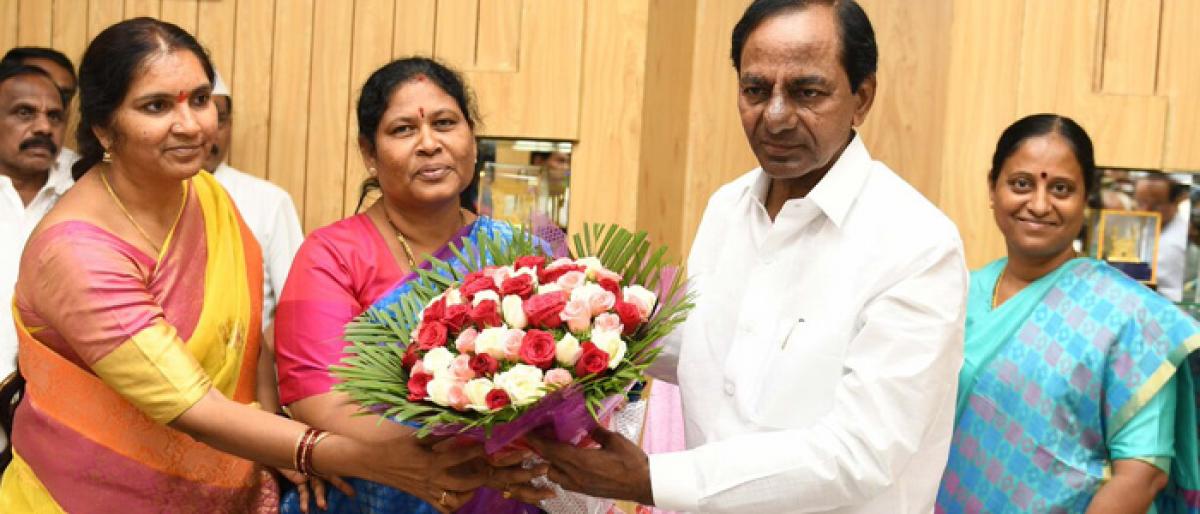Live
- 2024 on track to be hottest year on record
- PM Modi’s visit to Solapur: Women applaud ‘Double-Engine’ government’s initiatives
- Nagarkurnool MLA Dr. Kuchukulla Rajesh Reddy Campaigning in Maharashtra Elections
- Wife Kills Husband with Her Lover: Details of Veldanda Murder Case Revealed by SP Gaikwad
- Strict Action on Violations of Food Rights: Telangana Food Commission Chairman Goli Srinivas Reddy
- Smooth Conduct of Group-3 Exams with Strict Security Measures: Collector Badavath Santosh
- Delhi HC orders cancellation of LOC issued against Ashneer Grover, wife
- Shami’s absence a major blow for India in BGT, says Paul Adams
- Will organize protests at borders if attack on minority Hindus in Bangladesh not stopped: Bengal LoP
- Dutch Ambassador Marisa Gerard Meets Telangana CM A. Revanth Reddy in Delhi
Just In

The Assembly passed the Bill to bring in Telangana Panchayat Raj Act in the State on Thursday for regulating the functions of the rural local bodies and their public representatives.
Hyderabad: The Assembly passed the Bill to bring in Telangana Panchayat Raj Act in the State on Thursday for regulating the functions of the rural local bodies and their public representatives.
Chief Minister K Chandrashekar Rao said the enactment of the new PR Act would herald a new chapter in the history of rural local bodies which had been neglected for decades together. He said a separate legislation would be brought to regulate the functions of urban local bodies.
He said henceforth the gram panchayats would promote cleanliness and greenery in villages which had become dustbins despite the presence of giant administrative systems.
Giving reply to the discussion on the Bill in the Assembly, he said though a lot of legislations had been brought by the successive governments to regulate the functions of gram panchayats, nothing tangible was achieved. “There is a government, Ministers, officials, State level public representatives and 1.60 lakh public representatives of local bodies. But the villages remained dustbins due to their negligence,” he said.
He said the idea of Panchayat Raj system was not there at the time of Independence and Community Development Department used to take care of rural and urban civic issues. The Block Samithis which had come into existence took up development activities.
Patancheru was the first block panchayat in Andhra Pradesh and former Assembly Speaker P Ramachandra Reddy was the first block president. The block presidents had been given a lot of powers and they used to give salaries to the employees. Later, the Panchayat Raj system came into existence. However, the governments had caused degeneration of panchayats and villages had become battlegrounds of political parties. Most of the panchayats had not been carrying out their responsibilities. Even though the government had provided them with saplings under Haritha Haram programme, they did not take care of them, the Chief Minister said.
The Chief Minister said the government had toyed with the idea of introducing no confidence motion in the panchayats, but it was dropped. He said it was the politicians who were responsible for the degeneration of panchayats. He said the responsibilities of panchayats had come down as the government had taken up Mission Bhagiratha programme to provide drinking water to each household of the village. Roads also had been constructed in villages, he said.
With the implementation of the PR Act, panchayats would get a lot of funds in the form of government grants, Central and State Finance Commissions grants and NREGS. The Chief Minister said there was no link between the Farmers Coordination Committees (FCCs) and panchayats. The FCCs were meant to help farmers to overcome the difficulties in agriculture.
He criticised that the Centre had unnecessarily introduced POIS system in the purchase of fertilisers. Though he had told Union Finance Minister Arun Jaitely such a system would damage the interests of farmers, the Centre had gone ahead without paying heed to his suggestion.
The Chief Minister made it clear that action would be taken on panchayat secretaries if Haritha Haram project was not implemented. He informed that with the new Act as many as 2,637 tribal hamlets would become panchayats. He said there would be no rotation of reservations in tribal panchayats. A village with even 100 population would get Rs 3 lakh per annum, a village with population of 250 would get Rs 15 lakh grants per year and with the new PR Act, as many as 12,751 new GPs would come into existence.
The number of municipalities would reach 147. The Nagar Panchayat system would be done away with. He refused the proposal of the Opposition to give power to issue cheques to the panchayat secretary and justified the decision to make upa-sarpanch as co-signer of the cheque.
Refusing the proposal to send the Bill to select committee, he said a lot of discussion was held with intellectuals and other stakeholders of the Panchayat Raj system. He promised to look into the issue of reservations to BCs in panchayats.

© 2024 Hyderabad Media House Limited/The Hans India. All rights reserved. Powered by hocalwire.com







